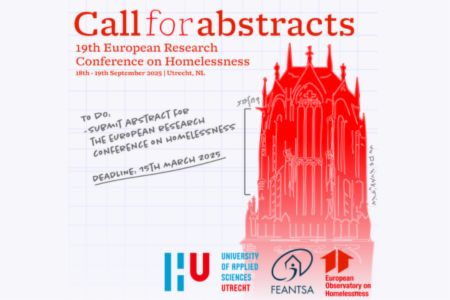Housing in Europe: Youth in danger!
FEANTSA and the Fondation Abbé Pierre publish our 6th Overview of Housing Exclusion in Europe on May 6, 2021
.png)
Read the full report here (PDF)
Read the executive summary here (PDF)
You can find the executive summary in FR, ES, IT, HU, DE in the download section on the right hand side of this page.
This new report is an opportunity to shed light on young people who, especially when poor, are worse affected by housing exclusion than the rest of the population, and were so even before the current health crisis. It also takes stock of the wave of poverty affecting all of Europe, more than a year after the start of the pandemic.
Young people are on the front line in the face of the health crisis: they are particularly affected by poverty and structural dysfunctions in housing markets.
According to Caritas, the demand for food aid in Western Europe increased by 25% to 30% between March and May 2020.
In France, since the start of the health crisis, 20% of young people aged 18 to 24 have had to resort to food aid and 35% fear that they will no longer be able to meet their housing expenses in 2021.
In terms of unemployment, in the UK, one in three young workers aged 18 to 24 have lost their job due to the pandemic, compared to one in six adult workers over 24. In Ireland, 15-24 year olds experienced the highest rates of job loss and short-time working: in April 2020, 46% had been placed on short-time work and more than a fifth (22%) had lost their employment.
If no preventive policy specifically focused on the great exclusion of young people is implemented quickly in the European Union, a new cohort of young people without resources will join the ranks of homeless people.

According to a Eurostat study, 4 in 100 people say they have been homeless at least once in their lifetime (from 1 in 100 in Hungary to 10 in 100 in Denmark). Among them, 3 in 100 people say they have already had to live with relatives on a temporary basis and 1 in 100 people say they have already lived on the street, in emergency or temporary accommodation or in a place not suitable for housing.
A third of the people surveyed state that family and/or relationship problems are the main reason for housing difficulties (in particular in Hungary and the United Kingdom, where this concerns more than 45% of the people surveyed). 25% cite unemployment, insufficient resources or financial problems and 17% the end of a rental contract or uninhabitable housing.

Without adequate preventive policies, a wave of people in difficulty will increase the pressure on reception and accommodation systems for homeless people, already saturated for several years.
Feantsa and the Fondation Abbé Pierre recommend in particular that the EU sets clear targets for the reduction and elimination of homelessness; that it anticipates the end of the health crisis with exceptional measures taken to protect the most disadvantaged and achieve zero post-covid homelessness; that it coordinates common tools at European level and that it encourages the regulation of rents in large towns and tight market areas.





